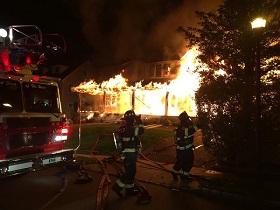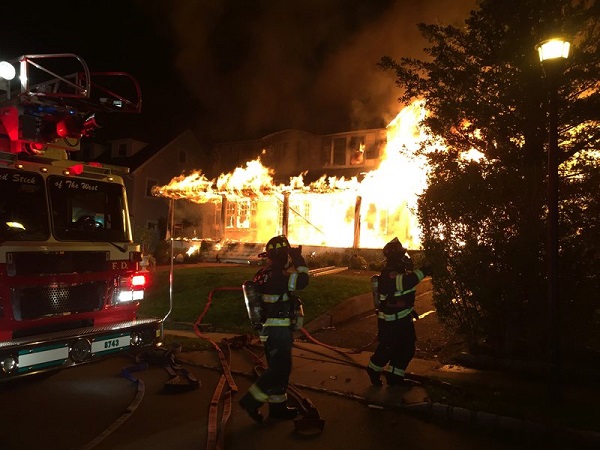

By Anne Gagliano
The 24-hour shift is unique, one that is most often associated with firefighters. It has many blessings and is typically preferred by firefighters and their families. The cost of doing business this way? Circadian rhythm disruption, as we creatures are not meant to be awakened in the night. This throws off sleep patterns, digestion, even hormonal balance. These imbalances can cause serious health issues, including heart disease and even cancer. They can lead to mood disorders, sleep deprivation, and substance abuse; ultimately, these problems may even impact a firefighter’s relationships. It is important, firefighter spouse, to be aware of these possibilities and to have a plan in place so that the impact of circadian rhythm disruption will be minimal to both your firefighter and to you.
To correct circadian rhythm disruption, it helps to know what regulates it. The three primary synchronizing agents of circadian rhythm are light, social/physical cues, and melatonin. Specialists focus on these three synchronizing agents when treating sleep disorders, as they can be used to help reset or restore circadian rhythm once it has been disrupted. The more we firefighter couples know about circadian rhythm, the better we will handle this schedule long term. Over time, we, too, can become “specialists” of a sort, as we learn to help our firefighters with the repercussions of the 24-hour shift.
Light: Of the three synchronizing agents, light is the strongest. It plays a crucial role in helping our bodies identify the time of day and the levels of energy we should produce. Light aligns circadian rhythm, and exposure to strong light during the day is essential for increased energy and levels of productivity. Blue light is the strongest; white light is the second strongest. But the problem with strong light, and particularly with blue, is this: Exposure to it at night interferes with the ability to sleep, as it impairs the pineal gland’s ability to produce melatonin—the sleep hormone.
For the firefighter, this is important to note. Over time, being awakened with light renders them hypervigilant or even more affected by light than the general population. Blue light is the strongest, so it is where we should start. Avoid blue light at least one hour, but preferably thwo to three hours, before bed. This will help anyone fall asleep faster, but for the hypervigilant, it is especially helpful.
Sources of blue light include LED lights, TV screens, computer screens, and cell phones. Applications are available to download onto your electronic devices for free that will dim or even change the blue light to white, which is less impactful. Some apps even self-regulate by mocking day patterns and gradually dimming as evening approaches. Blue-blocking glasses are also an option to be worn in the evening.
Studies on red lights are emerging, and this is an interesting option for the circadian-disrupted firefighter who has trouble sleeping. Red is the lowest-energy, slowest-moving form of visible light that has the least impact on the eyes. Red tricks the body into thinking no light is present and, in turn, encourages the release of melatonin. Red light apps, too, are available as downloads. Putting a red bulb in the bedside lamp, using red bulbs in night lights in the bathroom, or even putting them in fire station bunkrooms is food for thought.
In the firefighter bedroom, light-suppressing curtains will help, as even the dimmest light can impede melatonin secretion. Street lights, car lights—all of these may shine through and awaken the easily awakened. Darkness is the best sleep aid and the quickest way to reset circadian rhythm. It is terribly difficult to find in this modern age of 24-hour electronic availability, but firefighter couples should make every effort to supply it, as sleep is such a precious commodity for the night-shift worker.
Melatonin: Light suppresses melatonin, and studies show that the sleep-deprived have lower levels of melatonin than the general population. So it is here, firefighter families, that we have another chance to exhibit some control: Find sources of melatonin to give to your firefighter. Without normal levels of melatonin, insomnia or the inability to fall asleep naturally can develop. For the circadian-rhythm disrupted, this is a common problem, as the wake-sleep cycle is off and the body has trouble knowing when to produce and release melatonin. In desperation, insomniacs often seek sleep aids such as alcohol or pills or both. These are not only unhealthy options, but they can have serious repercussions for the firefighter marriage. Melatonin is a natural, healthy alternative with zero relationship side effects.
To jump start the severely deprived, melatonin supplements are an option, but these can cause an overdependence if used long term. I prefer natural sources–i.e., food. The very best source of naturally occurring melatonin is found in tart cherries. And they have to be tart; sweet cherries have 50% less melatonin, and dried cherries have none at all. A little glass of Montmorency (tart) cherry juice before bed has been proven to raise melatonin levels and thus promote sleep. (If you have trouble finding it in your store, try buying it online.) There is an anti-inflammatory property in tart cherry juice as well that renders it such an excellent sleep aid as this, too, aids in relaxation. Other sources of melatonin include pineapple, bananas, oranges, oats, sweet corn, rice, tomatoes, and barley.
Using the properties of light and dark in such ways as providing dark rooms in which to sleep and switching to more red and less blue are the first step in resetting circadian rhythms. Enhancing the diet with foods rich in melatonin is step two. These are tools we firefighter families can use to keep circadian rhythm disruption to a minimum. Sleep is the firefighter’s friend. With sleep comes the restorative effects of balance to all systems, and this balance will improve health and mood and family life. For step three, social/physical cues, read my next column.
Anne Gagliano has been married to Captain Mike Gagliano of the Seattle (WA) Fire Department for 30 years. She and her husband lecture together on building and maintaining a strong marriage.

